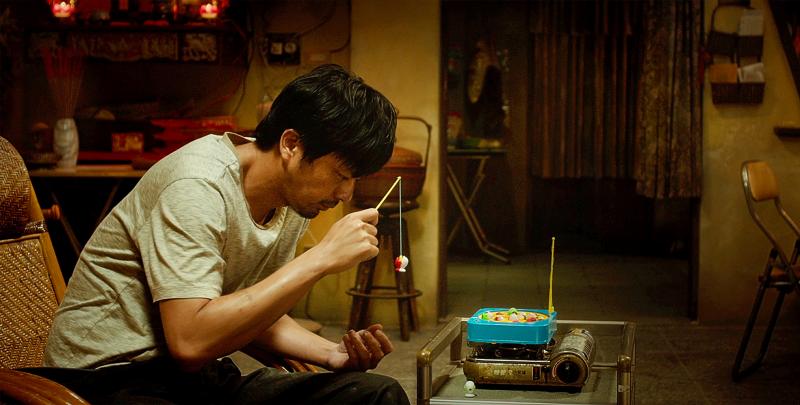Days Before the Millenium (徘徊年代) is one of those well-meaning films that tries too hard to be artsy and clever. The slightly surreal, two-part epic on the struggle of Vietnamese brides in Taiwan is stylishly shot and deeply layered but the result is a plodding, disjointed and often confusing viewing experience that seems to go on forever.
There’s a lot of issues director Chang Teng-yuan (張騰元) wants to explore, but his delivery is too deliberate. Character development and storytelling should be the first priority, but most of them become one-dimensional vehicles to illustrate the problems and flaunt his cinematic references.
The film begins in the mid-1990s on the eve of the Third Taiwan Strait Crisis, and follows the life of Van Tue (Annie Nguyen) who lives in the rural south with her abusive construction worker husband Chung-ming (Steven Chiang, 江常輝) and unforgiving mother-in-law (Chen Shu-fang, 陳淑芳).

Photos courtesy of iFilm
The sullen, spiritless Chung-ming spends his time slowly trying to build a brick house with materials stolen from work. The mother-in-law seems to only be concerned about pressuring Van Tue to have children, and despite their poverty they both frown upon Van Tue’s attempts to help the family financially by opening a food stall.
There’s a lot going on in the film, but the only character who gets any depth and sympathy is Van Tue, who eventually decides to run away.
Chang should be commended for not turning the movie into another unfortunate story that many such runaway brides suffer, such as being forced into sex work. Van Tue keeps a diary throughout the marriage, and the contents are briefly shown on the screen just twice, which is a bit abrupt and doesn’t really fit into the general atmosphere.

Photo courtesy of iFilm
The second part starts 90 minutes in, when it feels that the film is wrapping up. It takes place in the present day, and follows Thu Lan (Nguyen Thu Hang), an educated and ambitious Vietnamese immigrant who married a Taiwanese for love, and works at a private detective agency that mainly helps foreign brides catch their husbands cheating.
The cinematography completely changes and, for some reason, Thu Lan always has her back to the camera and never shows her full face. This is probably supposed to illustrate a point but it ends up being irritating and dehumanizing, as if she’s just a carrier for the narrative instead of being a real person. It’s a huge let down, especially after being invested in Van Tue’s character for the first 90 minutes.
The second part gets very confusing due to the many surreal devices Chang uses to connect it to Van Tue’s era; it’s obvious enough that while a lot has progressed, the immigrants still face similar struggles. Compared to the atmospheric, slow-burning first half, Thu Lan’s story is almost like a glossy commercial for the agency, and while the plot does have some connections to Van Tue, it could have just been an epilogue to the story instead of occupying another hour of the film.

Photo courtesy of iFilm
The magical realism Chang employs works in some places, such as the ageless pair of land surveyors who appear several decades apart looking exactly the same, continuing on with their casual banter on social issues and morality that provide the philosophical framework for the film. Use it too much, though, and it gets distracting when the same actors start appearing all over the place in seemingly different roles.
And it’s fine to leave some things up to the audience’s imagination, but doing it too much throughout the film creates plot gaps that bog down the story and prevent the viewer from seeing the bigger picture. It doesn’t even have to be one of the larger holes, little things such as Chung-ming appearing in one scene with an injured arm with no explanation are bothersome enough.
Being a Vietnamese bride in Taiwan is an important and interesting aspect of the immigrant experience, and Chang seems to genuinely care about the subject. Unfortunately, his ambitions get in the way.

The canonical shot of an East Asian city is a night skyline studded with towering apartment and office buildings, bright with neon and plastic signage, a landscape of energy and modernity. Another classic image is the same city seen from above, in which identical apartment towers march across the city, spilling out over nearby geography, like stylized soldiers colonizing new territory in a board game. Densely populated dynamic conurbations of money, technological innovation and convenience, it is hard to see the cities of East Asia as what they truly are: necropolises. Why is this? The East Asian development model, with

June 16 to June 22 The following flyer appeared on the streets of Hsinchu on June 12, 1895: “Taipei has already fallen to the Japanese barbarians, who have brought great misery to our land and people. We heard that the Japanese occupiers will tax our gardens, our houses, our bodies, and even our chickens, dogs, cows and pigs. They wear their hair wild, carve their teeth, tattoo their foreheads, wear strange clothes and speak a strange language. How can we be ruled by such people?” Posted by civilian militia leader Wu Tang-hsing (吳湯興), it was a call to arms to retake

Desperate dads meet in car parks to exchange packets; exhausted parents slip it into their kids’ drinks; families wait months for prescriptions buy it “off label.” But is it worth the risk? “The first time I gave him a gummy, I thought, ‘Oh my God, have I killed him?’ He just passed out in front of the TV. That never happens.” Jen remembers giving her son, David, six, melatonin to help him sleep. She got them from a friend, a pediatrician who gave them to her own child. “It was sort of hilarious. She had half a tub of gummies,

The wide-screen spectacle of Formula One gets a gleaming, rip-roaring workout in Joseph Kosinski’s F1, a fine-tuned machine of a movie that, in its most riveting racing scenes, approaches a kind of high-speed splendor. Kosinski, who last endeavored to put moviegoers in the seat of a fighter jet in Top Gun: Maverick, has moved to the open cockpits of Formula One with much the same affection, if not outright need, for speed. A lot of the same team is back. Jerry Bruckheimer produces. Ehren Kruger, a co-writer on Maverick, takes sole credit here. Hans Zimmer, a co-composer previously, supplies the thumping